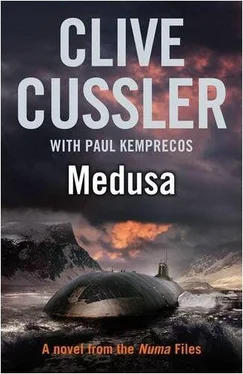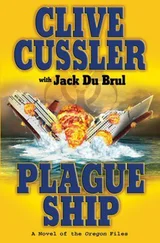Clive Cussler
Medusa
(NUMA Files – 8)
THE PACIFIC OCEAN, 1848
IN ALL HIS YEARS SAILING THE WORLD’S OCEANS, CAPTAIN Horatio Dobbs had never known the sea to be so barren. The captain paced the quarterdeck of the New Bedford whaling ship Princess, gray eyes darting like twin lighthouse beams to every point of the compass. The Pacific was a disk-shaped blue desert. No spouts feathered the horizon. No grinning porpoises danced off the bow. No flying fish skittered above the wave tops. It was as if life in the sea had ceased to exist.
Dobbs was considered a prince in the New Bedford whaling hierarchy. In the waterfront bars where hard-eyed harpooners gathered, or in the parlors of the rich Quaker shipowners on Johnny Cake Hill, it was said that Dobbs could sniff out a sperm whale at fifty miles. But only the rank smell of a simmering mutiny had filled the captain’s nostrils of late.
Dobbs had come to dread having to record each day of failure in the ship’s logbook. The entry he had penned in his log the night before summed up the troubles he faced. He had written:
March 27, 1848. Fresh breeze, SW. Not a whale in sight. Hard luck hangs over voyage like a stinking fog. No oil in all of Pacific Ocean for poor ship Princess. Trouble brewing in the fo’c’sle.
Dobbs had a clear view of the length of the ship from the elevated quarterdeck, and he would have had to be blind not to see the averted gazes and the furtive glances from his crewmen. The ship’s officers had reported with alarm that the usual grumbling among the forecastle crew had become more frequent and vehement. The captain had instructed his mates to keep pistols ready and never to leave the deck unattended. No hand had yet been lifted in mutiny, but in the dark and dingy forecastle, the cramped living quarters located where the bow narrowed, men were heard to whisper that the ship’s luck might change if the captain were to meet with an accident.
Dobbs was six foot four and had a profile like a cliff. He was confident he could put down a mutiny, but that was the least of his worries. A captain who returned to port without a profitable cargo of oil had committed the unpardonable sin of costing the ship’s owners their investment. No crew worth its salt would ever ship out with him. Reputation, career, and fortune could rise or fall on a single voyage.
The longer a ship spent at sea, the greater the chance of failure. Supplies ran short. Scurvy and disease became more likely. The ship’s physical condition deteriorated and the crew lost its edge. Putting into port for repairs and supplies was risky. Men might jump ship to sign on to a more successful vessel.
The whaling expedition had gone downhill since the crisp autumn day when the gleaming new ship had pulled away from the bustling wharf to a roaring send-off. Dobbs was bewildered by the change in the ship’s fortunes. No ship could have been better prepared for its maiden voyage. The Princess carried an experienced captain, a handpicked crew, and newly forged, razor-sharp harpoons.
The three-hundred-ton Princess was built by one of the most reputable shipyards in New Bedford. Just over a hundred feet long, the ship had a beam of nearly thirty feet that gave her room to store three thousand casks that could hold ninety thousand gallons of oil in her hold. She was built of sturdy live oak that could withstand the toughest seas. Four whaleboats rested in wooden davits that overhung the deck rails. Other mariners scorned the wide-bodied and square-ended New England whaling ships, but the rugged craft could sail for years through nasty conditions that would have had their sleeker counterparts leaking at the seams.
As the Princess left the dock, a spanking breeze had filled the great square sails that hung from the three masts, and the helmsman steered a course east out of the Acushnet River and into the Atlantic Ocean. Pushed by steady winds, the Princess had made a fast ocean crossing to the Azores. After a brief stop in Fayal to load up on fruit that would ward off scurvy, the vessel had pointed its bow toward the southern tip of Africa, rounding the Cape of Good Hope with no mishaps.
But in the weeks that followed, the Princess had zigzagged across the Pacific without seeing a single whale. Dobbs knew that finding whales had more to do with a solid knowledge of weather and migratory patterns than luck, but as he scanned the distant skyline in desperation, he began to wonder if his ship was cursed. He pushed the dangerous thought from his mind, strode over to the ship’s cook, who was cleaning his stove, and said, “Play us a song with your fiddle.”
Hoping to lift morale, the captain had urged the cook to play his fiddle at sunset every day, but the jolly music only seemed to highlight the sour mood aboard ship.
“I usually wait ’til sundown,” the cook said glumly.
“Not today, cook. See if you can fiddle up a whale.”
The cook put his cleaning rag aside and reluctantly unwrapped the cloth protecting his weather-beaten violin. Tucking the fiddle under his jowls, he took up the frayed bow and sawed away without tuning the instrument. He knew from their sullen looks that the crew thought his fiddling scared the whales away, and each time the cook played he feared, with good reason, that someone might toss him overboard. On top of that, he was down to two strings and his repertoire was limited, so he played the same songs the crew had heard a dozen times before.
As the cook sawed away, the captain ordered the first mate to take charge of the quarterdeck. He climbed down the narrow companionway to his cabin, tossed his weathered top hat onto his bunk, and sat down at his desk. He scanned his charts, but he had tried all the usual whaling grounds with nothing to show for his efforts. He sat back in his chair, closed his eyes, and let his chin drop to his chest. He had only dozed off for a few minutes before the wonderful words he hadn’t heard in months penetrated his veil of sleep.
“She blows !” a voice repeated. “Thar she blows.”
The captain’s eyes snapped wide open, and he came out of his chair like a catapulted projectile, grabbed his hat, and vaulted up the ladder to the deck. He squinted against the bright sunlight at the main masthead a hundred feet above the deck. Three mast-heads were manned in two-hour shifts, with the lookouts standing inside iron hoops on small platforms.
“Where away?” the captain shouted to the mainmast lookout.
“Starboard quarter, sir.” The lookout pointed off the bow. “ There. She breaches.”
A huge hammer-shaped head rose from the sea a quarter of a mile away and splashed down in an explosion of spray. Sperm whale. Dobbs barked at the helmsman to steer for the breaching whale. Deckhands scrambled into the rigging with the agility of monkeys and unfurled every square inch of canvas.
As the ship came slowly around, a second lookout shouted down from his perch.
“ Another, Captain!” The lookout’s voice was hoarse with excitement. “By God, another. ”
Dobbs peered through his spyglass at a shiny gray back mounding from the sea. The spout was low and bushy, angled forward forty-five degrees. He moved the telescope to the right and then to the left. More spouts. A whole pod of whales. He let forth with a deep whooping laugh. He was looking at a potential fortune in oil.
The cook had stopped playing at the first sighting. He stood on the deck dumbfounded, his fiddle hanging limply at his side.
“You did it, cook!” the captain shouted. “You fiddled up enough spermaceti to fill our hold to the decks. Keep on playing, damnit.”
Читать дальше












